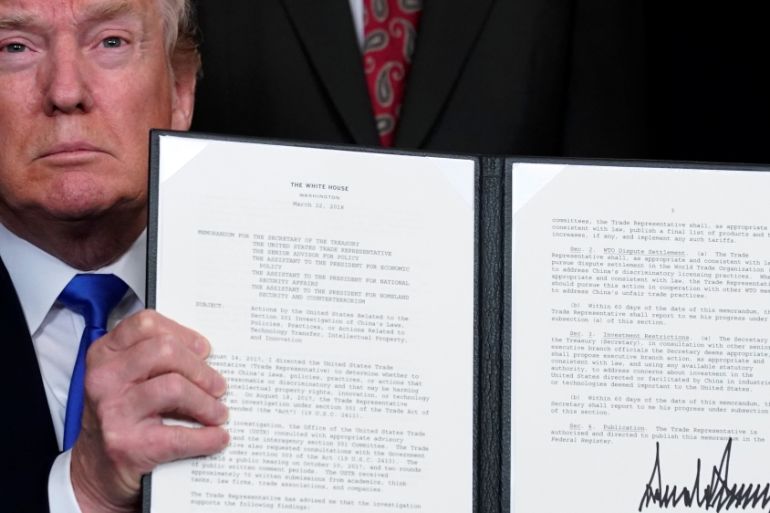Trump to impose tariffs on $60bn of Chinese imports
The US president’s move is seen as a direct shot in a brewing trade war between the world’s two biggest economies.

US President Donald Trump has signed an order that paves the way for imposing tariffs on as much as $60bn worth of Chinese goods imports, prompting China to threaten retaliation.
The move on Thursday is seen as a direct shot in a brewing trade war between the world’s two biggest economies.
Keep reading
list of 4 itemsFull jury panel seated on third day of Trump’s New York hush-money trial
Seven jurors seated on the second day of Trump’s New York hush-money trial
Six takeaways from first day of Trump’s New York hush money criminal trial
Saying it would be the “first of many” trade actions, Trump said the measure was aimed at punishing Beijing over the alleged theft of US technology and Chinese pressure on American companies to hand it over.
“We have a tremendous intellectual property theft situation going on,” Trump told reporters.
The White House said that Trump would direct the Office of the US Trade Representative (USTR) to publish a detailed product list of proposed tariffs within 15 days. USTR has already identified potential targets: 1,300 product lines worth about $48bn.
The president is also asking Treasury Secretary Steven Mnuchin to come up with a list of restrictions on Chinese investment.
Referring to the US’ $375bn trade deficit with China, which he blamed for the loss of American jobs, Trump said: “It is the largest deficit of any country in the history of our world. It is out of control.”
Trump will direct US Trade Representative Robert Lighthizer to identify and publish a proposed list of products that could be subject to tariffs.
He will also direct Lighthizer to take action against China at the World Trade Organization, charging Beijing with preventing US companies from licensing their technology in China.
The measure also directs the US Treasury to develop new proposals to increase safeguards on investments that could compromise US national security.
Chinese response
Beijing urged the US on Friday to “pull back from the brink”.
“China doesn’t hope to be in a trade war, but is not afraid of engaging in one,” the Chinese commerce ministry said in a statement.
China unveiled its own plans to impose tariffs on up to $3bn of US imports in retaliation.
The developments shook stock and currency markets on Friday with investors fearing a trade war.
Stocks plunged on Wall Street on goods and investment from China. The Dow Jones industrial average dropped more than 700 points.
Japan’s benchmark Nikkei 225 index plunged 4.3 percent to 20,671.11 and South Korea’s Kospi tumbled 2.4 percent to 2,437.31.
Hong Kong’s Hang Seng lost three percent to 30,144.95 and the Shanghai Composite in mainland China sank 3.4 percent to 3,151.71.
Australia’s S&P/ASX 200 skidded 2 percent to 5,819.70. Benchmarks in Taiwan and Southeast Asia also fell.
Steel and aluminium tariffs
The move against China comes just as the US prepares to impose tariffs of 25 percent on imported steel and 10 percent on aluminium – sanctions that are meant to hit China for flooding the world with cheap steel and aluminium.
But US Trade Representative Robert Lighthizer said on Thursday that Europe, Australia and South Korea are among a significant list of trading partners to be initially exempt from new US tariffs on foreign steel and aluminium.
Testifying to the Senate Finance Committee, Lighthizer said that Trump has decided to “pause the imposition of the tariffs” while negotiating with a “list” of additional countries.
“We have Europe, we have Australia, we have Argentina, we have Brazil, who am I forgetting? And obviously, Korea, where we’re negotiating, of course,” he said.
While signing off on the tariffs against China, Trump insisted the country was still a “friend”.
“I have tremendous respect for President Xi (Jinping),” Trump said, trying to limit the fallout. “We have a great relationship.”
“I view them as a friend,” he added.
Al Jazeera’s Kimberly Halkett, reporting from the White House, said there was a “mixed review” in the US Congress “because of the president’s approach, which seems to be all over the map in terms of executing this”.
“Essentially, what this comes down to is that these tariffs are targeting just one country: China,” said Halkett.
“Looking at it, you have to say that with friends like these, who needs enemies?”